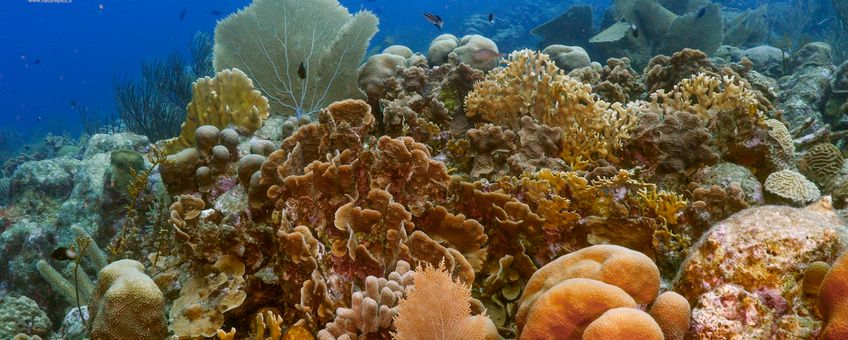
New and very abundant microbe found living in corals
Carmabi, Dutch Caribbean Nature Alliance (DCNA)Corals have a well-studied symbiotic relationship with a photosynthetic microorganism (Symbiodiniaceae, dinoflagellates), where corals provide shelter and protection in exchange for the energy Symbiodiniaceae produce through photosynthesis. It would now appear that a newly identified microorganism living inside corals, corallicolids, have entered this equation. These corallicolids appear to be very abundant and are only outnumbered by the Symbiodiniaceae. Weirdly, this newly discovered microbe, which they have dubbed 'corallicolids' coming from Latin meaning 'coral-dwellers', contains all four genes required for producing chlorophyll, but lacks the genes needed for photosynthesis.
Professor Patrick Keeling, a botanist from the University of British Columbia and senior author of the study, stated that “having chlorophyll without photosynthesis is actually very dangerous because chlorophyll is very good at capturing energy, but without photosynthesis to release the energy slowly it is like living with a bomb in your cells”. Furthermore, genome sequencing of corallicolids shows that this microbe is likely an ancestor of parasitic Apicomplexa as Plasmodium, which causes malaria. This leaves scientists to wonder: "What do these light harvesting microbes do and what important role do they play being within coral’s microbiomes?" For more information, please watch the following video which further explains this study:
Corals' curious symbiont (Source: Minute papers)
Research around Curaçao
A group of researchers from the University of British Columbia and the CARMABI Foundation have collaborated to better understand the eukaryotic microbial community composition of wild and commercial corals, specifically to determine the distribution of corallicolids. 43 wild coral samples were collected off the coast of Curaçao, representing the most common species of hard corals. Commercial species were purchased directly from vendors, comprising of 102 samples, representing at least 61 species from all over the world. 85 percent of the wild corals contained corallicolids, whereas 53 percent of the commercially obtained corals contained corallicolids, showing that these newly identified microorganisms are very abundant within corals from around the world. They also noted that almost all of the corals studied appeared to be healthy, hinting that corallicolids were not detrimental to the coral’s health. It is still unclear how corallicolids are able to process the energy gained from chlorophyll without the photosynthesis process.
Previous studies have not linked the presence of chlorophyll to a process other than photosynthesis. Therefore, if corallicolids do not use chlorophyll to photosynthesis energy, this leads scientists to wonder what role chlorophyll plays in its lifecycle. Furthermore, scientists found these corallicolids in both sun coral (Tubastrea sp.) and black coral (order Antipatharia), both of which are considered to be non-photosynthetic corals. Corals are under immense stress due to harshening conditions brought by climate change, maybe understanding the total life processes within corals can help scientists find a way to protect them in the future.

Eukaryotic microbes
Microbes or microorganisms are very small organisms which you can only see if you use a microscope. Eukaryotes are organisms whose cells have a nucleus enclosed with membranes. Eukaryotic microbes are normally not focused on in traditional studies of coral’s microorganisms.
Text: Jessica Johnson & Tineke van Bussel, DCNA and Mark Vermeij, Carmabi Curaçao
Photos: Y. & T. Kühnast, Naturepics
Video: Minute papers
